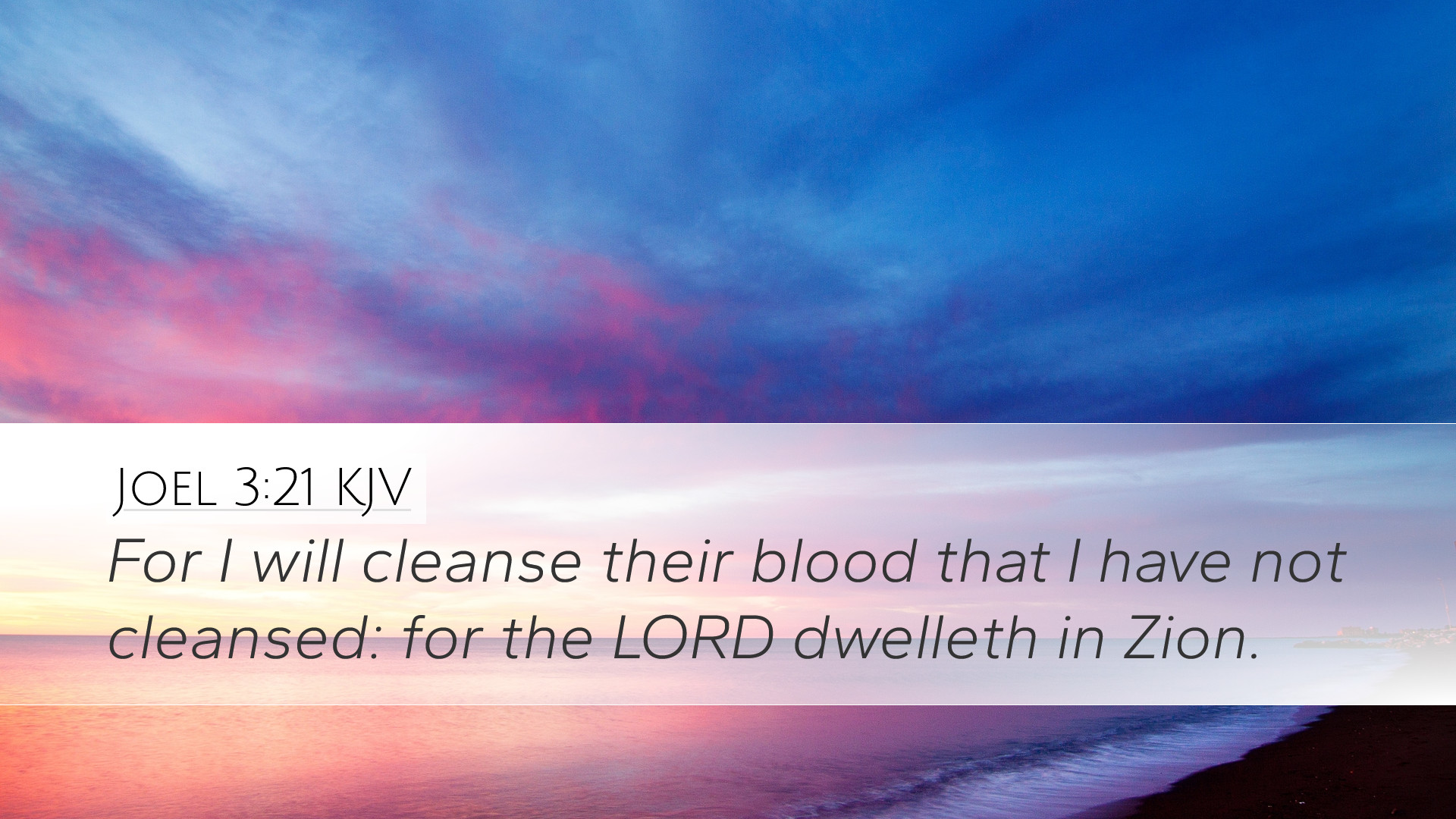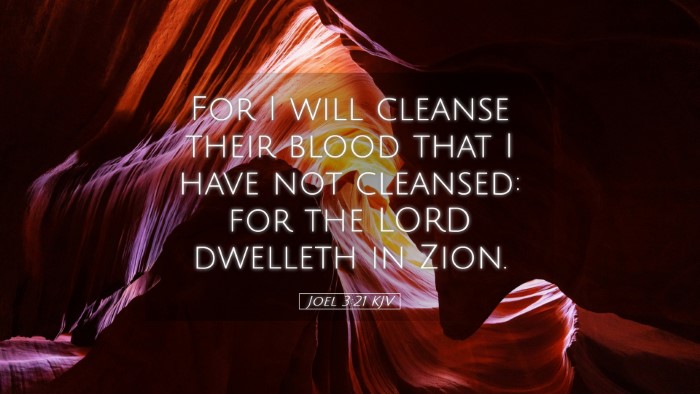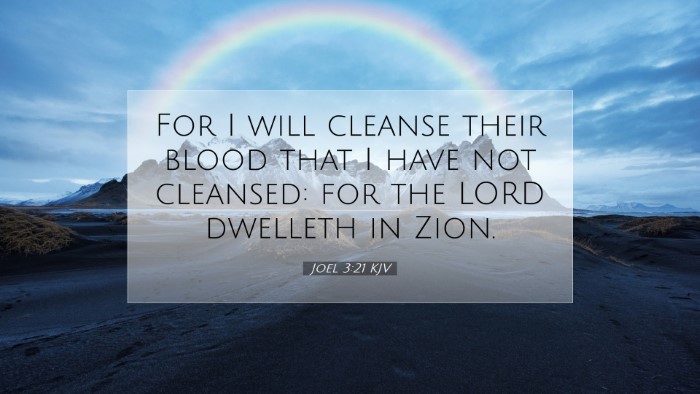Old Testament
Genesis Exodus Leviticus Numbers Deuteronomy Joshua Judges Ruth 1 Samuel 2 Samuel 1 Kings 2 Kings 1 Chronicles 2 Chronicles Ezra Nehemiah Esther Job Psalms Proverbs Ecclesiastes Song of Solomon Isaiah Jeremiah Lamentations Ezekiel Daniel Hosea Joel Amos Obadiah Jonah Micah Nahum Habakkuk Zephaniah Haggai Zechariah MalachiJoel 3:21
Joel 3:21 KJV
For I will cleanse their blood that I have not cleansed: for the LORD dwelleth in Zion.
Joel 3:21 Bible Commentary
Commentary on Joel 3:21
Verse Context: Joel 3:21 states, "For I will cleanse their blood that I have not cleansed: for the Lord dwelleth in Zion." This verse continues the themes of restoration and divine justice that permeate the book of Joel. As the prophet looks forward to the ultimate vindication of God's people, this particular verse brings forth several key theological insights pertinent for understanding God's redemptive plan.
Importance of Divine Cleansing
The phrase "I will cleanse their blood" highlights an essential aspect of God’s redemptive work. The imagery of blood in the biblical context often denotes life and sacrifice. According to Matthew Henry, the mention of cleansing indicates a need for purification from sin; it symbolizes God’s desire to sanctify His people. This purification can be understood both morally and spiritually, where God not only seeks to remove the stains of guilt but also to restore the community to its intended righteousness.
Theological Implications
- Restoration of the Covenant Community: The cleansing mentioned can be seen as a restoration of the covenant relationship between God and His people. Albert Barnes mentions that this act of cleansing is an assurance of God's promises being fulfilled, where He will actively engage in the lives of His people, leading them back to a place of holiness and communion.
- Divine Sovereignty: Joel’s assertion that "the Lord dwelleth in Zion" affirms the sovereignty of God over His chosen people. As Adam Clarke posits, Zion represents not only the physical locality of Jerusalem but also the spiritual abode of God’s presence among His people. This presence implies protection and blessing, leading to a restored identity for Israel.
- Judgment and Mercy: The verse juxtaposes judgment and mercy, where prior to this cleansing, there was a significant cry for justice against the Lord's enemies. Matthew Henry emphasizes that understanding God’s judgment upon their oppressors results in a deeper appreciation for His love and mercy in restoring His people.
The Nature of God's Justice
The promise of cleansing is also a proclamation of divine justice. Albert Barnes illustrates that while judgment may have come upon Israel for their sins, God's ultimate purpose is restoration rather than destruction. This portrays the God who acts justly but also preserves hope and offers redemption, which is crucial for pastoral counseling and theological reflection today.
Encouragement for Present Believers
For pastors and theologians today, this verse serves as a rich source of encouragement. The assurances of God's cleansing work resonate with modern believers who seek forgiveness and sanctification. Echoing Adam Clarke's view, understanding the depth of this promise can inspire practical preaching on God's grace and the transformative power of the Holy Spirit, who actively works in believers' lives.
Application for the Church
In practical terms, the church can glean several applications from Joel 3:21:
- Holiness and Community Restoration: The community's shared responsibility in seeking and reflecting God's holiness is emphasized. Matthew Henry encourages a communal approach to repentance, fostering an environment where believers support one another in their journeys of sanctification.
- The Assurance of God’s Presence: In proclaiming that "the Lord dwelleth in Zion", there is a call for believers to cultivate practices that acknowledge God's continuous presence through worship, prayer, and the sacraments. Albert Barnes suggests that this acknowledgment should produce a profound sense of peace and security among the congregation.
- Hope in Times of Despair: For those experiencing loss or turmoil, this verse stands as a beacon of hope. Adam Clarke notes that knowing God’s intention to cleanse and restore can guide individuals through the darkness, reassuring them of the light that comes from God’s promises.
Conclusion
Joel 3:21 encapsulates the heart of God's restorative plan as it extends mercy and cleansing to His people, thereby affirming the divine presence among them. For pastors, students, and scholars, engaging deeply with this verse invites a holistic understanding of God's character as both just and merciful. Through this passage, believers are reminded of the essential unity between God’s judgment and His unrelenting love, which ultimately leads to the revival of faith, hope, and community.


